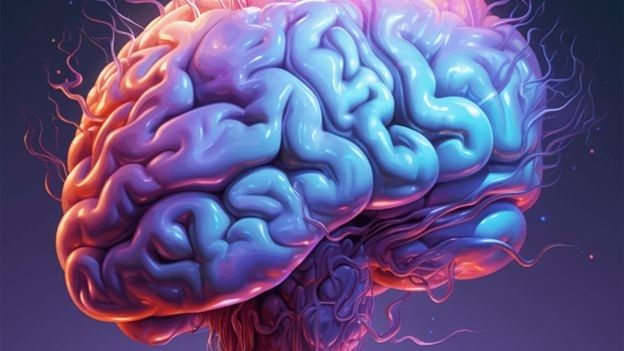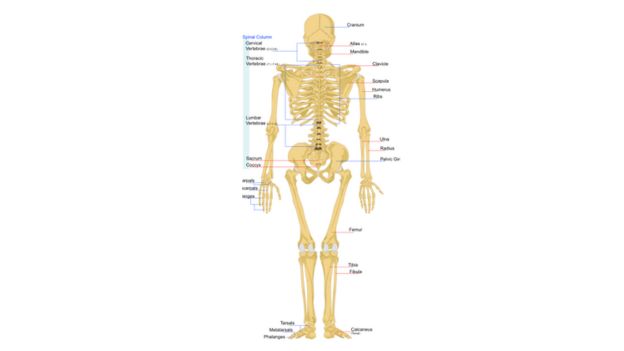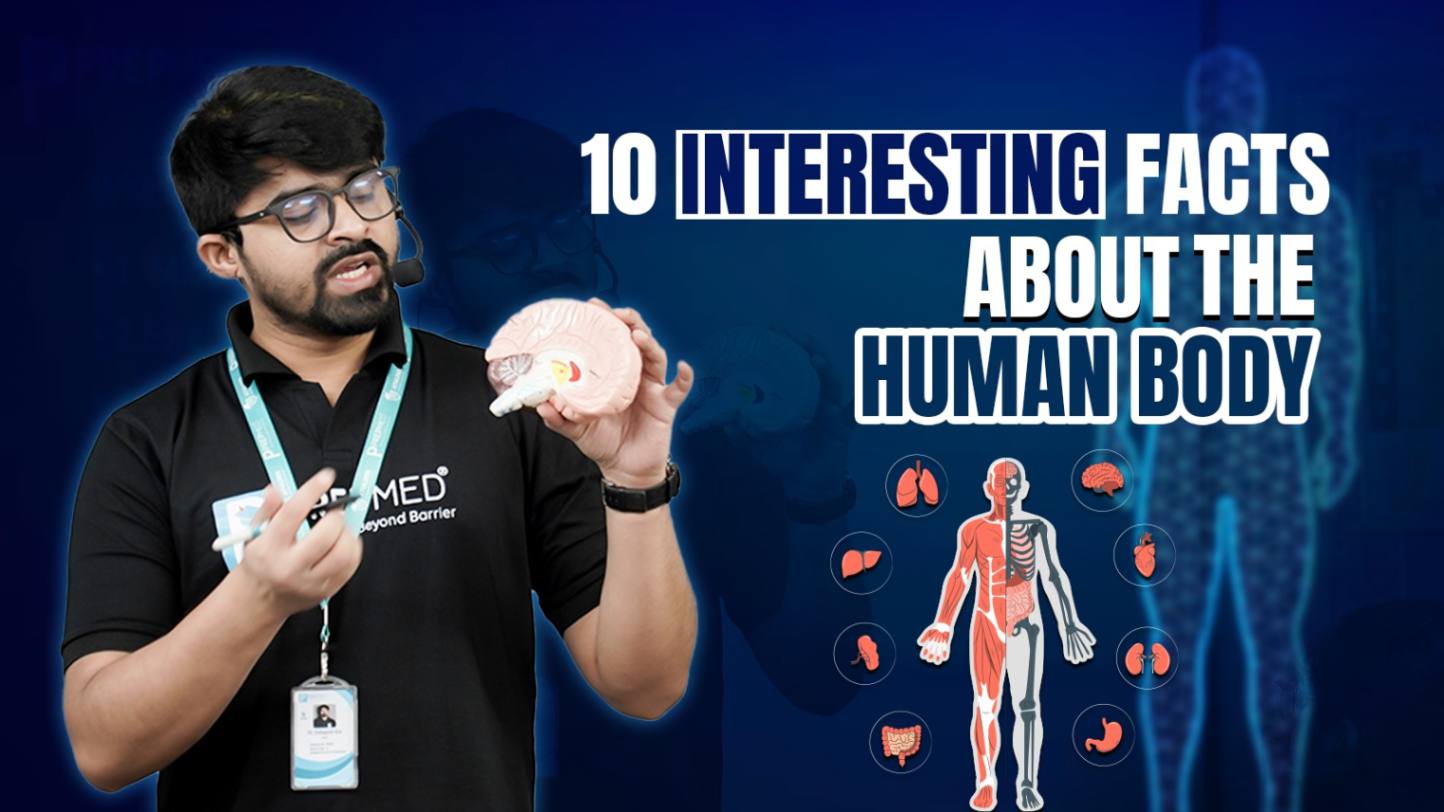September 01, 2024
10 Interesting Facts about the Human Body
The human body is made up of different systems, each with its unique functions, all working together to keep everything in balance. Every part has a special role in maintaining homeostasis, which keeps our bodies functioning properly. There are so many interesting facts about the human body that can help us appreciate the amazing complexity of human anatomy even more.
Brain:

The human brain has an incredible power to perform several operations.
- This powerful part comprises 2% of the human body using 20% of oxygen from blood along with 25% of glucose.
- It weighs around 3 pounds. It makes 38 trillions of operations every second to make the body and mind work.
- It comprises 86 billion nerve cells.
Musculoskeletal system:

The musculoskeletal system is developed by bones, muscles, and joints giving the human body a particular shape.
- At birth, the human body contains around 270 bones which decreases to 206 bones when entered in adulthood.
- At the center of bones, there is bone marrow making new blood cells. Even bone marrow also preserves fat and minerals.
- Cartilaginous, synovial, and fibrous joints that connect different bones allow the human body to move freely.
Fingerprints:
Humans are the only organisms that have fingerprints.
- Fingerprints are a unique and permanent feature that are different for every individual, even identical twins.
- Fingerprints are developed by oil and sweat which can be identified after touching objects.
- Because of their uniqueness, fingerprints are widely used around the world as a key method for identifying people.
Heart’s workload:

When the human body is engaged in any activity, the heart needs to function effectively to keep up.
- It beats around 100,000 times per day to pump approximately five liters of blood.
- Chronic stress and a heavy workload on the body can result in increased blood pressure, arrhythmias, and heart disease.
- The heart behaves differently when we are asleep compared to when we are working out, leading to noticeable changes in heart rate.
Eye power:
The human eye has stayed the same since birth.
- The color and structure of the iris are unique for every individual making it an indicator of identity similar to a fingerprint.
- The human eye can detect a candlelight flame from a distance of 30 miles.
- The blood vessel’s pattern of the human eye is unique providing a smaller picture of the nervous system.
- The cornea doesn't contain any blood vessels. The outer part gets nutrients and oxygen from tear fluid and the inner part gets nourishment from aqueous humor.
Tongue print:
The tongue print is similar to fingerprints having uniqueness for every person.
- A human tongue with a smoother texture, bumps, and cracks is considered generally a healthier one.
- Tongue prints are stable and genetically independent over time and protected physically.
- This muscle functions without a skeleton and is considered one of the strongest and most sensitive ones.
Skin:
On average, every person sheds around 30k to 40k dead skins.
- The top layer of skin, the epidermis constantly replaces old skin.
- Sometimes skin shedding can be caused by diseases like peeling skin syndrome (PSS) which affects the protein responsible for skin shedding.
- The skin of an adult on average covers around 20 square feet.
Hair growth:
It grows in a predictable cycle of four specific phases determined by different factors like nutrition, age, and health outcomes.
- Human hair grows half an inch every month. However, hair growth is unique and affected by hormones.
- Hair grows faster in people under 30, but the growth rate gradually slows down as they reach early old age.
- Hair grows faster due to higher blood circulation during summer.
Stomach lining:
The stomach lining containing millions of glands is known as Mucosa.
- It produces hydrochloric acid, digestive enzymes, bicarbonate, and mucus that help to absorb nutrients and digest food.
- Lining within the stomach renews every two weeks. With this renewal, the stomach makes adequate hydrochloric acid making the stomach stronger to even dissolve metal.
- Epithelial cells within the stomach lining generate necessary hormones for stimulating appetite, regulating the gallbladder, and secreting digestive enzymes or gastric acid.
Smell:
Smell plays a crucial role in our daily lives, influencing how we interact with our surroundings and the things around us.
- Among all the five sensory organs, human olfactory sensations also work even while asleep.
- Around 80% of what a person perceives as taste is influenced by their sense of smell, due to the receptors in their nose.
- However, as people age, the sense of smell gradually weakens and decreases by 75% in those over 80 years old.
Frequently Asked Questions (FAQ’s):
1. How much oxygen does the human brain consume?
The human brain consumes 20% of the oxygen supplied by the blood, despite comprising only 2% of the body’s weight. It also uses 25% of the body's glucose to perform numerous complex operations.
2. Why do humans have fewer bones in adulthood compared to at birth?
Humans are born with around 270 bones, but as they grow, some of these bones fuse, resulting in 206 bones in adulthood. This natural fusion helps strengthen the skeletal structure and supports the body’s development.
3. Are fingerprints unique to humans, and do they change over time?
Yes, fingerprints are unique to humans and remain unchanged throughout a person’s life. Even identical twins have different fingerprints, making them a reliable method of personal identification.
4. How often does the stomach lining renew itself, and why is this important?
The stomach lining renews itself every two weeks. This renewal helps protect the stomach from the harsh effects of hydrochloric acid and digestive enzymes, ensuring it can continue to digest food effectively without being damaged.
5. What role does the sense of smell play in our perception of taste?
The sense of smell significantly influences taste, with around 80% of what we perceive as flavor being determined by olfactory receptors in the nose. This is why our sense of smell is crucial for experiencing flavors in food.
For more details on PrepMed and to find the nearest coaching center, visit PrepMed’s official website
Follow Us - on Facebook /Instagram/ YouTube






